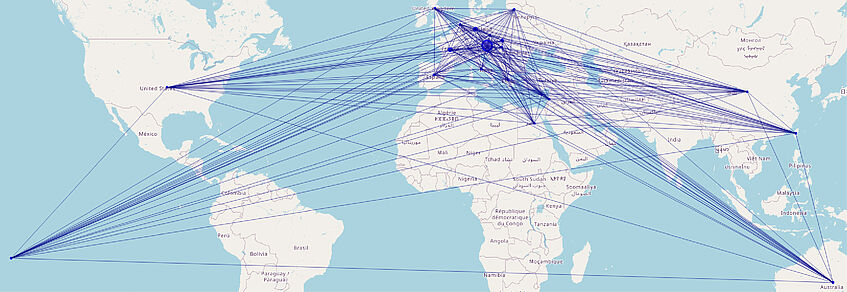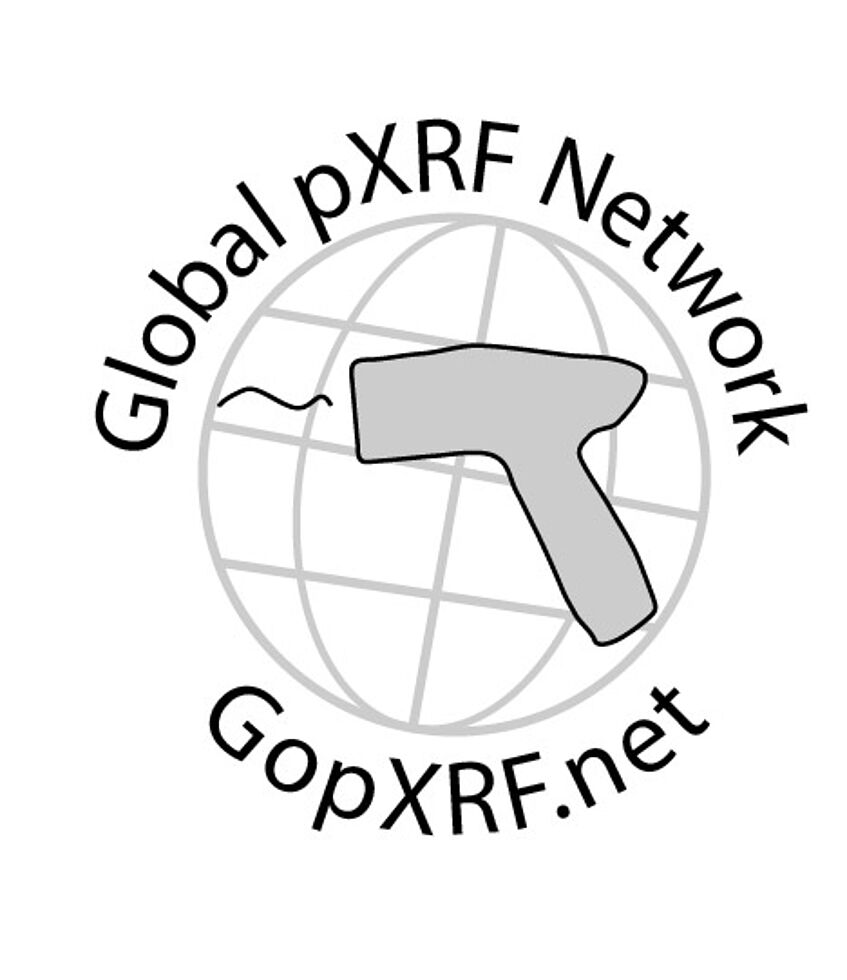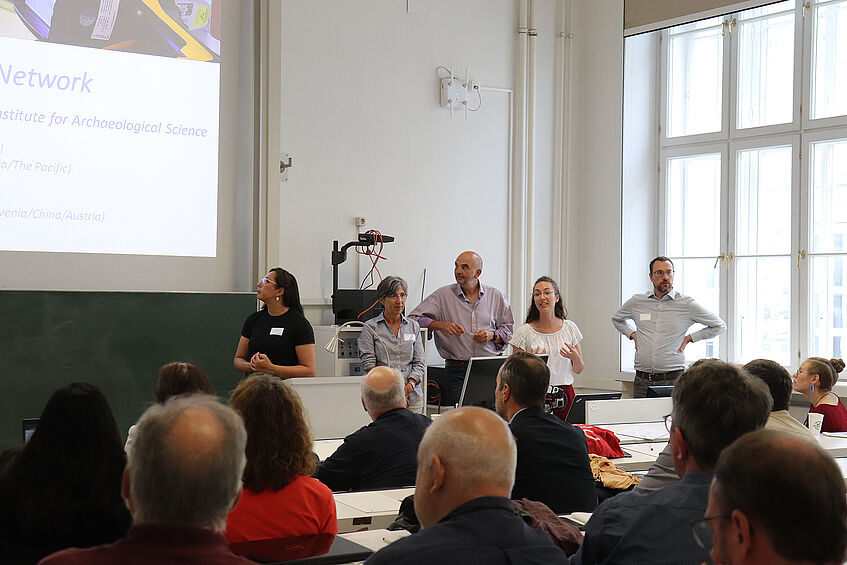
The Global p-XRF Network (GopXRF.net)

The Global p-XRF Network (GopXRF.net)
Following the enthusiastic reception at the Conference on Methodological Innovations in p-XRF Studies (MeIn p-XRF), our Global p-XRF network is now starting to take shape!
This network aims to create a collaborative and resourceful community for p-XRF applications in archaeology and heritage. It will serve as a scientific hub, promoting the exchange of knowledge, skills, and support in the use of p-XRF technology. Led by a team of experts, the network's mission is to foster collaboration, advance best practices, and build a dynamic, self-sustaining community centered around p-XRF applications.
Key Objectives
- Support and Resources: Provide and promote resources and guidance to support a growing community of users and foster best practices across diverse p-XRF applications in archaeology and heritage.
- Exchange of Knowledge: Facilitate opportunities to exchange ideas and knowledge about current and emerging practices through conference sessions, workshops, training, and more.
- Sustaining the Community: Establish a self-sustaining network where specialists, laboratories, standards and reference materials (certified and in-house) can be found and put to best use by all members.
- Guidance and Innovation: Draft, discuss and disseminate agreed-upon guidance on a variety of applications (e.g., soils, metals, glass, obsidian, pigments) to define and implement best practices and drive further innovation.
Join the Network!
This is an open invitation to join the newly formed Global p-XRF network. In the moment, communication takes place via an email list, which serves as the primary channel until the official network website is launched. Those interested in staying informed about the latest developments, resources, and events related to p-XRF are very welcome to join.
For any questions or ideas regarding the network, the organising team is eager to engage and collaborate with the wider community! Just get in touch via michaela.schauer@univie.ac.at.
Network Conference 2026 - Save the date!
We’re delighted to announce that our 2026 network conference
“Where Physics, Chemistry and Archaeology Meet: Applications and Case Studies in (p)XRF"
will be held on 30th March 2026 at the Natural History Museum Vienna with an Ice Breaker Event on the 29th
Please find updates on the Conference Website!
Where to Meet the Network in 2026
- GopXRF.net Conference: Where Physics, Chemistry and Archaeology Meet: Applications and Case Studies in (p)XRF on 30th March 2026 at the Natural History Museum Vienna
- Session S36: Composed for Success: Making the Most of Chemical Data in Archaeometry on 31rst March to 4th April 2026 at the University of Vienna - CfP open from 15th of September to 9th of November
EAA 2025 - Session: Recent developments in HH-pXRF studies and the Global p-XRF Network (GopXRF.net)
The organisers would like to express their sincere thanks to everyone who joined and contributed to our EAA session on Tuesday, 2 September 2025, from 02:00 to 06:30 pm CET. All presenters kept courageously to their time slots and delivered thought-provoking talks on inter- and intra-device calibration, best practices for sediment analysis, guidelines for AI integration, and non-destructive pXRF analysis of paintings.
These contributions sparked lively discussions, which we continued together in the plenum. Feedback from participants highlighted the inspiring and constructive nature of the debate, underlining the value of exchanging perspectives across such a diverse community.
We were especially encouraged that several attendees offered to collaborate further with the Core Team, helping us to continue developing the Global pXRF Network. The session showed once more how much can be achieved when expertise and ideas are shared openly.
The session was divided into two parts: a series of oral presentations of 10 Minutes/each followed by a discussion.
The topics covered by speakers were:
- 2:00-2:10pm - Introduction to the session topics and to the network: “GopXRF.net" (M. Schauer/L. Dallai)
- 2:10-2:20pm - Portable XRF: A Powerful Tool in Archaeometry – When You Know the Rules of Physics in X-Ray Analysis (K. Schneider et al.)
- 2:20-2:30pm - Good practices and recommendations on geochemical soil mapping with pXRF (in the field and in the lab) (S. Save)
- 2:30-2:40pm - p-XRF in the Analysis of Anthropogenic Sediments: Field vs. Laboratory Protocols (K. Rix et al.)
- 2:40-2:50pm - Analytical Settings, Calibration. Comparing pXRF Data for Obsidian and Other Materials (R. Tycot)
- 2:50-3:00pm - Expanding Use of UAV, pXRF and Artificial Intelligence (AI) in Multi-scalar Archeology Applications (K. Sharp)
- 3:00-3:10pm - Portable XRF in the service of cultural heritage: Some cases studies highlighting its merits and limitations (K. Gebremariam)
Please find the full abstracts here.
3:10-3:20pm - Break
3:20-6:30 pm - Plenary discussion:
- Inter- and Intra-Device Calibration (chaired by K. Schneider & R. Tycot)
- Best Practices & Guidelines for Sediment Analysis in Archaeological Soils (chaired by S. Save, L. Dallai, K. Rix & R. Doonan)
- Guidelines for AI Integration in pXRF (chaired by K. Sharp)
- Studies Best Practices for Non-Destructive pXRF Analysis of Paintings (chaired by K. Gebremariam)
WAC 2025 - Session & Workshop
We’re happy to share that our participation at WAC-10 in Darwin was a real success! Our session Innovations in the Use of Portable X-Ray Fluorescence (pXRF) in Archaeometry on 27 June was packed - quite literally, with not everyone managing to find a seat. Especially the strong interest in the case studies made for a memorable afternoon. A big thank you to all our presenters and attendees!
The following day, our workshop How to Calibrate pXRF Data for Archaeological Research was just as well attended. Lee Drake kicked things off with a great introduction to p-XRF principles and the importance of spectral analysis. The Q&A session that followed was full of energy and shared enthusiasm - organisers and participants alike really enjoyed the exchange.
Recordings of both the session and workshop will be available in the coming days for all registered WAC-10 participants via the Virtual WAC platform.
It was a real pleasure to meet so many pXRF practitioners from around the world, especially from the Global South, and we’re excited to welcome more than 20 new researchers to our network!
Colloquia on portable X-Ray Fluorescence
Led by the network and endorsed by the European Academy of Sciences & Arts/STEMAC Expert Group, we are organising a series of online colloquia (first lectures be found here) to explore the use of pXRF in archaeology and cultural heritage. The colloquia aim to provide a platform for knowledge exchange, featuring expert presentations from both the natural sciences and the humanities. Each session will include 30-minute talks by specialists from archaeology and natural sciences, followed by a 30-minute discussion. Topics include:
- Resources and guidance for the XRF community
- Case studies and exemplary applications
- Opportunities for knowledge exchange
Recordings of the colloquia are available.
Participants can submit case study reviews for publication in PEASA (www.peasa.eu).
For more information or to propose a topic, contact Michaela Schauer (michaela.schauer@univie.ac.at), Keelie Rix (keelie.rix@upf.edu) or Ioannis Liritzis (ioannis.liritzis@euro-acad.eu).
Our next lecture will be held on 26th November, 6-8 pm CET
- Mai Abdelgawad (Centre d'Etudes Alexandrines, UAR3134 Cnrs/Ifao & UBM - Université Bordeaux Montaigne, France): 10 Years of pXRF Application: Monitoring Results and Improving Protocol of Measurement
- Camille Frugier (Centre d'Etudes Alexandrines, UAR3134 Cnrs/Ifao & Université de Poitiers): Insights from MATEGEE programme: Comparing pXRF data to characterise amphorae productions from Kition, Alexandria and Delos
- The Abstract Flyer can be found here
This year’s lecture series will conclude with a highlight on 17th December:
- Ellery Frahm (Yale University): Building a foundation for pXRF of ceramics: Developing the BRICC sets
- Kyle Freund (Idaho National Laboratory): Assessing the Impact of Firing on the Elemental Composition of Clays using X-Ray Fluorescence Spectrometry
- The Abstract Flyer can be found here
Please join the colloquium here and feel free to share the information!
Lecture Archive:
29th of October 2025:
Lee Drake (University of New Mexico & Decision Tree LLO): XRF and Machine Learning
Anno Hein (N.C.S.R. Demokritos): Machine Learning approaches in the evaluation of pXRF data in provenance studies of transport amphorae
The Abstract Flyer can be found here, the recording here
25th of June 2025:
Detlef Wilke (Management and Consulting GmbH, Wennigsen): Large Scale Application of Non-Destructive XRF Analysis for Ceramic Provenancing – Prerequisites, Results and Limitations
The Abstract Flyer can be found here, the recording here
28th of May 2025:
Patrick Quinn (Institute of Archaeology, University College London): pXRf of Ancient Ceramics and Lithics at UCL IoA
Clive Bonsall (Prof. Emeritus of Early Prehistory, University of Edinburgh): Reflections on Carpathian Obsidian: The p-XRF Revolution
The Abstract Flyer can be found here, the recording here
30th of April 2025:
Johannes Sterba (Center for Labelling and Isotope Production, TRIGA Center, Atominstitut, TU Wien) & Kai Riehle (Institute for Klassische Archäologie, University of Tübingen): Local pottery production and imports at Monte Iato: a chemical and an archaeological perspective
The Abstract Flyer can be found here, the recording here
27th of March 2025:
Robert Tykot (Department of Anthropology, University of South Florida, Tampa): Up-to-Date Assessment of Non-Destructive pXRF Analysis of Obsidian in the Mediterranean
Theodora Moutsiou (Archaeological Research Unit, University of Cyprus): Obsidian maritime connections in the Eastern Mediterranean Prehistory
The Abstract Flyer can be found here, the recording here
12th February 2025:
Sofia Soares (with Teresa Pena and Patrícia Jodão): Which Rock is This? - Challenges for pXRF Studies in Raw Material Provenance
Michelle Richards: pXRF for Geochemical Rock Classification in Archaeometry: A Pacific Case Study
The p-XRF Research Forum
The p-XRF Research Forum is a community event for members of GopXRF.Net only with a strict data protection policy, providing a safe space for discussing unpublished data, draft ideas for papers, projects, fieldwork, and experiments using p-XRF. It is especially aimed at young researchers and those wanting to discuss new ideas. It offers a unique opportunity for feedback on studies, results, and approaches from specialists in a protected environment.
Each Forum will consist of a 15-minute presentation of the research question, followed by 45 to 60 minutes of feedback and discussion.
At the first forum on the 7th of Feburary at 10 am CET via Zoom, Hakan Aycan explored the following topic with the community: Considering a New P-XRF Databank for Roman Tableware: Advantages and Limitations.
Core Team of the Initiative

Initiating the Network at the Conference on Methodological Innovations in p-XRF Studies (MeIn pXRF) at Vienna in September 2024
Core Team of the Initiative
The network is guided by an international team of scholars and practitioners:
- Michaela Schauer (Austria)
- Michelle Richards (Australia)
- Roger Doonan (UK)
- Luisa Dallai (Italy)
- Ioannis Liritzis (Greece)
- Lee Drake (USA)
- Mai Abdelgawad (Egypt)
